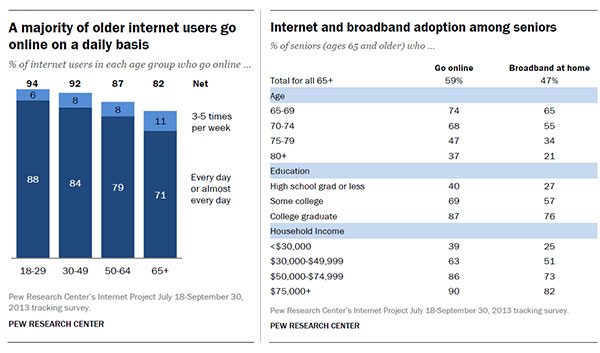The assumptions are true—senior citizens lag behind younger adults in the adoption of technology and internet use for everyday life—but don't let that fool you. The percentage of older adults making the internet part of their daily lives is steadily rising. Plus, according to the Pew Research Center, many seniors are willing to learn new tools (with some help) and are actually more socially active online than their younger family members.
According to the Pew Research study,
Older Adults and Technology Use (April 2014), the adoption of technology—specifically, internet use including email, smartphones, tablets, ebooks and social networking sites (SNS) like Facebook—is increasing among adults aged 65 and older.
The study states that six in ten seniors, or 59 percent, report going online, a six-percentage point increase since a survey conducted the previous year. Additionally, the rate at which younger, higher-income and more well-educated seniors use the internet and broadband is approaching—and even exceeding—that of the general population. (Internet and broadband adoption drop off, the study notes, around age 75.)
Though older adults tend to face some hurdles to adopting new technologies, such as physical challenges, skeptical attitudes or difficulties learning them, once they join the online world, most seniors make internet use and digital technology an integral part of their daily lives.

Among the takeaways of the survey are:
- 68 percent of Americans in their early 70s go online.
- 90 percent of affluent seniors, those with an annual household income of $75,000 or more, go online (compared to 39 percent of those earning less than $30,000 annually).
- 87 percent of well-educated seniors, those with a college degree, go online (compared to 40 percent of those who have not attended college).
- 71 percent of seniors who use the internet go online every day.
Additionally, a majority of older internet users have positive attitudes about the benefits of online information in their personal lives, with 79 percent believing that people without internet access are at a disadvantage and 94 percent believing the internet makes finding information much easier.
So, what does it mean for optical? With more and more aging eyes in the population, senior eyecare can be a major facet of your practice. Think about taking a new approach to your online marketing efforts. The study found that nearly half (46 percent) of older adults who are online use social networking sites such as Facebook, and 81 percent of those socialize on a daily or near-daily basis. Try out a senior-focused post about preserving eye health later in life. Share an article detailing a few easy steps to keeping eyes healthy. Send out an email blast with senior eye health tips and a call for action to make an eye exam appointment. Whatever you do, don't think they're not watching—seniors may never reach the millennial status digital technology adoption, but they are present online and their presence will only continue to grow.